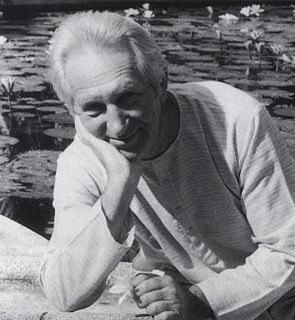A Quote by Johann Wolfgang von Goethe
Plants and flowers of the commonest kind can form a pleasing diary, because nothing which calls back to us the remembrance of a happy moment can be insignificant.
Related Quotes
Fortunate are the nations that can build wooden houses. Because wood breathes, transforms, deteriorates, like us. It is also important to have flowers and plants where we live, because they breathe, too. Contemplating a flower for three seconds can be a captivating solitary journey back to original geometry, which is always revitalizing.
Without our fully realizing it, flowers would become for us an expression in form of that which is most high, most sacred, and ultimately formless within ourselves. Flowers, more fleeting, more ethereal, and more delicate than the plants out of which they emerged, would become like messengers from another realm, like a bridge between the world of physical forms and the formless.
And this, and many other like blessings, we enjoy daily. And for most of them, because they be so common, most men forget to pay their praises: but let not us, because it is a sacrifice so pleasing to Him that made that sun and us, and still protects us, and gives us flowers, and showers, and stomachs, and meat, and content, and leisure to go a-fishing.
Quite generally, the familiar, just because it is familiar, is not cognitively understood. The commonest way in which we deceive either ourselves or others about understanding is by assuming something as familiar, and accepting it on that account; with all its pros and cons, such knowing never gets anywhere, and it knows not why.... The analysis of an idea, as it used to be carried out, was, in fact, nothing else than ridding it of the form in which it had become familiar.
Can any man say with certainty that he was happy at a particular moment of time which he remembers as being delightful? Remembering it certainly makes him happy, because he realizes how happy he could have been, but at the actual moment when the alleged happiness was occurring, did he really feel happy? He was like a man owning a piece of ground in which, unknown to himself, a treasure lay buried.
What does he plant who plants a tree?
He plants the friend of sun and sky;
He plants the flag of breezes free;
The shaft of beauty, towering high, he plants a home to heaven anigh.
For song and mother-croon of bird, in hushed and happy twilight heard -
The treble of heaven's harmony.
These things he plants who plants a tree.
Oh, give us pleasure in the flowers to-day;
And give us not to think so far away
As the uncertain harvest; keep us here
All simply in the springing of the year.
Oh, give us pleasure in the orchard white,
Like nothing else by day, like ghosts by night;
And make us happy in the happy bees,
The swarm dilating round the perfect trees.
There is no argument so cogent not only in demonstrating, the indestructibility of the soul, but also in showing that it always preserves in its nature traces of all its preceding states with a practical remembrance which can always be aroused. Since it has the consciousness of or knows in itself what each one calls his me. This renders it open to moral qualities, to chastisement and to recompense even after this life, for immortality without remembrance would be of no value.
Life is like a garden. Quite naturally, leaves wither and flowers fade. Only if we clear the decay of the past then and there can we really enjoy the beauty of the new leaves and flowers. Likewise, we must clear the murkiness of the past bad experiences from our minds. Life is remembrance in forgetfulness. Forgive what ought to be forgiven; forget what ought to be forgotten. Let us embrace life with renewed vigor. We should be able to face every moment of life with renewed expectation, like a freshly blossomed flower.
In truth, politeness is artificial good humor, it covers the natural want of it, and ends by rendering habitual a substitute nearly equivalent to the real virtue. It is the practice of sacrificing to those whom we meet in society, all the little inconveniences and preferences which will gratify them, and deprive us of nothing worth a moment's consideration; it is the giving a pleasing and flattering turn to our expressions, which will conciliate others, and make them pleased with us as well as themselves. How cheap a price for the good will of another!






































